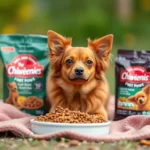
Introduction
The bond between humans and dogs often leads to the delightful habit of sharing food. As pet owners, we want to provide the best for our furry companions, but this raises a pressing question: can dogs eat Pop Tarts? This popular snack, known for its sugary filling and flaky crust, may seem harmless, but understanding dog nutrition is crucial for your pet’s health and well-being.
Proper nutrition is not just about satisfying hunger; it plays a significant role in a dog’s overall health, energy levels, and longevity. With countless snacks available, knowing which foods are safe for dogs is essential. In this article, we will explore whether dogs can safely indulge in Pop Tarts and what implications this might have on their health.
Overview of Sections
We’ll begin by diving into the basics of dog nutrition, discussing essential nutrients, common dog food ingredients, and foods to avoid. Next, we’ll take a closer look at Pop Tarts, including their ingredients and nutritional profile. Then, we’ll answer the burning question about dogs and Pop Tarts, highlighting the potential risks and signs of adverse reactions. Afterward, we’ll suggest healthier snack alternatives for dogs to enjoy. Finally, we will summarize key points and provide additional insights.
Understanding Dog Nutrition
Basic Nutritional Needs of Dogs
Dogs require a balanced diet that includes a variety of nutrients to thrive. The primary macronutrients essential for canine health are:
- Proteins: Vital for growth, repair, and maintenance of body tissues.
- Fats: Provide energy, support cell structure, and help absorb certain vitamins.
- Carbohydrates: Offer a source of quick energy and aid in digestion.
In addition to macronutrients, dogs also need micronutrients, including vitamins and minerals, which support bodily functions and overall health. A well-rounded diet helps maintain a healthy weight, promotes a shiny coat, and supports a robust immune system.
Common Ingredients in Dog Food
Commercial dog foods typically contain a mix of ingredients tailored to meet a dog’s nutritional needs. Proteins can come from various sources, including:
- Animal proteins: Such as chicken, beef, and fish, which provide essential amino acids.
- Plant proteins: Like peas and lentils, which can supplement protein but may not provide all necessary amino acids.
The quality of carbohydrates is also important. Whole grains, such as brown rice and oats, are preferable to fillers like corn and soy, which offer little nutritional value.
Foods to Avoid
Certain human foods can be toxic to dogs and should be avoided at all costs. These include:
- Chocolate: Contains theobromine, which is highly toxic to dogs.
- Grapes and raisins: Can cause kidney failure.
- Onions and garlic: Can damage red blood cells.
Additionally, many human snacks are laden with sugars, salts, and unhealthy fats that can harm your dog’s health in the long run.
What are Pop Tarts?
Ingredients in Pop Tarts
Pop Tarts are a popular convenience snack made with a pastry crust filled with various sweet fillings. A typical list of ingredients includes:
- Sugars: High levels of sugar are present, contributing to the overall sweetness.
- Artificial flavors: Used to enhance the taste.
- Preservatives: To extend shelf life, which may not be suitable for dogs.
Understanding these ingredients is essential when considering whether to share this snack with your dog.
Nutritional Profile of Pop Tarts
Pop Tarts are not known for their nutritional value. A standard serving contains:
- Calories: Approximately 200 per pastry.
- Sugars: Often exceeds 15 grams per serving.
- Fats: Typically around 5 grams, including unhealthy trans fats.
Given this profile, it is clear that Pop Tarts are not a healthy choice for dogs.
Variants and Flavors
Pop Tarts come in various flavors, from classic strawberry to indulgent cookies and cream. Each flavor may contain additional ingredients, such as chocolate or high-fructose corn syrup, which can further complicate their suitability for dogs.
Can Dogs Eat Pop Tarts?
Short Answer and Explanation
In short, dogs should not eat Pop Tarts. While a small piece may not cause immediate harm, the cumulative effects of high sugar content, artificial ingredients, and potential allergens make them an unsuitable snack for dogs.
Potential Risks of Feeding Pop Tarts to Dogs
-
High Sugar Content: Dogs are not designed to process high levels of sugar. Regular consumption can lead to obesity, diabetes, and dental issues.
-
Artificial Ingredients: The preservatives and artificial flavors found in Pop Tarts can lead to gastrointestinal upset and allergic reactions in some dogs.
-
Gluten and Grains: Many dogs can be sensitive to gluten or have grain allergies. The pastry crust in Pop Tarts is made from refined flour, which can exacerbate these issues.
Signs of Adverse Reactions in Dogs
If a dog consumes Pop Tarts, monitor them for signs of distress, which may include:
- Vomiting or diarrhea
- Lethargy or unusual behavior
- Itching or skin irritations
- Changes in appetite
If you notice any concerning symptoms, contacting your veterinarian is advisable.
Healthier Snack Alternatives for Dogs
Safe Human Foods for Dogs
Fortunately, there are many safe and healthy human foods that dogs can enjoy in moderation. Some dog-friendly options include:
- Carrots: A crunchy, low-calorie treat rich in vitamins.
- Apples: Provide fiber and vitamins (just remove the seeds).
- Peanut butter: A favorite for many dogs, but ensure it’s free from xylitol, which is toxic.
Commercial Dog Treats
There are countless commercial dog treats designed specifically for canine diets. Look for options that are:
- Grain-free: If your dog has sensitivities.
- High in protein: To support muscle health.
- Natural ingredients: Free from artificial additives.
Homemade Dog Treat Recipes
Creating homemade dog treats can be a fun and healthy alternative. Here are two easy recipes:
Peanut Butter and Banana Treats:
– 1 ripe banana, mashed
– 1/2 cup peanut butter (ensure it’s xylitol-free)
– 1 cup whole wheat flour
Mix the ingredients, roll into small balls, and bake at 350°F for 10-12 minutes.
Pumpkin and Oat Treats:
– 1 cup canned pumpkin (not pumpkin pie filling)
– 2 cups oats
– 1/4 cup water
Combine, shape into small treats, and bake at 350°F for 15-20 minutes.
Conclusion
In summary, while the idea of sharing snacks like Pop Tarts with our dogs may seem appealing, the risks far outweigh any potential enjoyment. Pop Tarts are filled with sugar and artificial ingredients that can harm your dog’s health. Instead, focus on providing a balanced diet rich in high-quality dog food and consider healthier snack alternatives that meet their nutritional needs.
Always prioritize your dog’s health by choosing safe, nutritious options. If you have questions or concerns about your dog’s diet, consulting with a veterinarian is always a wise step.
FAQs
Can dogs have sweets in moderation?
While a small treat now and then may not harm your dog, it’s best to avoid giving them sugary snacks regularly. Opt for healthier alternatives instead.
What should I do if my dog eats Pop Tarts?
If your dog consumes Pop Tarts, monitor them closely for any adverse reactions. If you notice symptoms like vomiting or diarrhea, contact your veterinarian for guidance.
How can I tell if my dog has a food allergy?
Signs of food allergies in dogs can include itching, swelling, gastrointestinal upset, and changes in behavior. If you suspect an allergy, consult with your veterinarian for diagnosis and treatment options.









